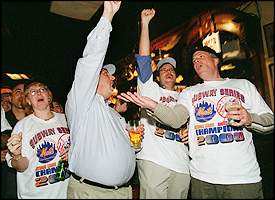|
|
NEW YORK -- As Subway Series mania spills into the workplace
with bosses, employees and clients loudly proclaiming their team
allegiance, etiquette experts are urging a quieter approach.
|  | | Employees of Cadwalader, Wickersham & Taft, watch game 3 of the World Series. As Subway Series mania spills into
the workplace with bosses, employees and clients loudly proclaiming their team allegiance, etiquette experts are urging thinking first. |
The experts say sports etiquette is right up there with which
fork to use for your salad. And in some workplaces, the advice
comes none too soon.
"There have been some big arguments at work," said Tom Quinn,
a 38-year-old construction worker with a Mets logo carved into his
hair. "I admit that I'm adding to the intensity of the situation,
but that's part of the fun."
At Rubenstein Associates, the public relations firm that
represents the Yankees, company president Howard Rubenstein admits:
"There are some closet Mets fans in our office, but they wouldn't
dare wear the Mets logo at work. They keep quiet."
Well, sort of.
His assistant, Alex Hampsas, admitted after some hesitation: "I
have a couple Mets pictures taped to my computer in a way that
nobody can really see them but me. Mets fans are kind of looked
down upon here. When people around the water cooler are talking
about how great the Yankees are, I just walk away."
And Rubenstein's chauffeur, Dominick Gonzalez, said the Subway
Series has brought the issue of loyalty to the fore.
"I've been working for Rubenstein for 15 years, and I like the
Yankees just fine. But my loyalties are my loyalties and, well,
baseball is baseball," Gonzalez said. "I just have to stay loyal
to the Mets."
Charles Winter, president of The National League of Junior
Cotillions, an etiquette and social training program based in
Charlotte, N.C., said, "I think it's important to keep things in
perspective. After all, our main reason for going to work is to
make a living."
But, he added, sports is a sword that cuts both ways.
"Being sensitive to other people's feelings is very important,
and I'd be careful what to wear to work," Winter said.
"On the other hand, camaraderie can be an important thing in a
business. People just have to use a little common sense."
Barbara Gilmour, who teaches kids and teenagers at her
Gibbsboro, N.J., school, Etiquette Etc., said: "Sports is a good
topic unless you're going to get irate about it and go over the
edge. ... If somebody you're talking to is for the other team, I'd
say just cool it a little bit. You're not going to win an argument
about it."
Others advised serious sports fans to bite the bullet and
listen, not blurt.
"In this case it's a really volatile situation because both
teams are from the same city," said Shawna Schuh, founder of the
Web site www.Social-graces.com, based in Portland, Ore. "I always
say that if you're really passionate about something, keep your
mouth shut until you see which way the wind blows. Start out with
'What did you think of the game?' not 'The Yankees are the
greatest.' "
Adds Marie Drolet of the consulting firm Cornerstone
Innovations: "I would advise against shaving your head and against
getting tattoos."
Etiquette guru Miss Manners has written in her syndicated column
that even those with no interest whatsoever in sports should be
polite about it: "All you really need to do is to make some
sociable sound, to indicate that you accept the good will intended.
'Gee, I don't know; who do you think is going to win?' is a good
one, but even, 'Haven't been following it lately' will do if said
pleasantly."
Tell that to the guys shaving logos into their hair.

Copyright ©2000 ESPN Internet Ventures. Terms of Use and Privacy Policy and Safety Information are applicable to this site. Click here for a list of employment opportunities at ESPN.com.
|
|
|
|
|
